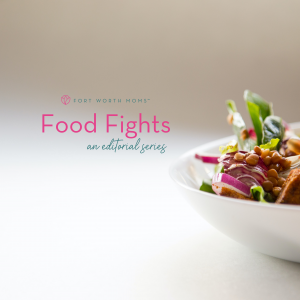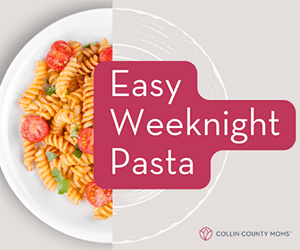This article is part of an editorial series, “Food Fights,” brought to you by Fort Worth Moms. Follow the “Food Fights” event page for special giveaways, social engagement, and published articles. Join our subscriber list so you don’t miss a moment of “Food Fights” and all Fort Worth Moms has to offer throughout the year.
I’m a many times reformed emotional eater. Anyone else? I’d be hard pressed to find a mom friend in my circle who hasn’t struggled with emotional eating (or emotional NOT eating) at times. And the pandemic certainly hasn’t helped.
And it makes sense. Food is tied to comfort and strong emotions from the very first moments of our lives: birthday cakes, a warm bowl of mac and cheese after a long day at school, mom’s cookies with a glass of milk, and I could go on. Seriously, my mom’s baking is like WOW. Not to mention, it’s biological. Comfort foods boost the levels of dopamine, the feel-good chemical in our brains that is also boosted by alcohol and drugs of abuse.
So it’s no wonder that most of us have used comfort foods to soothe uncomfortable emotions at some point. I mean, it works . . . temporarily. Personally I’ve eaten away sadness, anger, boredom, anxiety, you name it. And yeah, it helped me to escape my awareness of that feeling . . . temporarily.
>> RELATED READ :: Mama, Break that Food-Shame Cycle {with an Intuitive Approach to Eating} <<
 BUT the more I’ve learned about myself, the more I see how much that emotional eating has cost me.
BUT the more I’ve learned about myself, the more I see how much that emotional eating has cost me.
Not only has it cost me in terms of my physical health, but ultimately it didn’t “get rid” of the uncomfortable feelings in the long-run. Rather, it’s often produced feelings of guilt, which then snowballed into more comfort eating. Then regret and self-blame. Then eating. Vicious cycle!
>> RELATED READ :: A Case Not to Diet <<
And my work as a psychologist has shown me I’m definitely not alone.
 At the end of the day, what’s helped my patients and me break this cycle (again and again) is:
At the end of the day, what’s helped my patients and me break this cycle (again and again) is:
- Showing myself some compassion. I’ve had to learn how to be kind to myself when I fall back into the cycle. Because beating ourselves up NEVER WORKS! In my experience and that of my patients, self-blame always makes it worse. Instead, I just remind myself that I can’t change what’s happened in the past. I can only choose to be more mindful and make different choices in the here and now.
- Making a conscious effort to be mindful and aware of my emotions, especially before I eat. This often looks like me asking myself, “What am I feeling right now? Am I trying to self-medicate some discomfort? What emotion really needs my attention right now?”
- Telling myself that the emotion I’m trying to push away is a valid feeling that I can sit with and survive. What is the feeling trying to tell me? And how can I process this emotion in a way that won’t cost me further?
- Reminding myself of my “whys.” I want to be around for my family. I want to feel good about myself. I want to model good coping for my kids. Reminding myself of my values has helped me intervene in the cycle many a time.
- Asking myself, “Is this [insert tasty item] worth the cost?” Usually, the answer is no.
- Self-compassion AGAIN! Why is it so important? I’m still learning, as is every other human on the planet. I’m learning my own patterns, my own emotions, and growing in my ability to manage them healthfully — even as a professional in the field. No one is immune from the desire to avoid pain; that’s just part of our humanity. Giving ourselves grace around being human is the foundation of healthier coping.














Thank you for sharing these tips!!